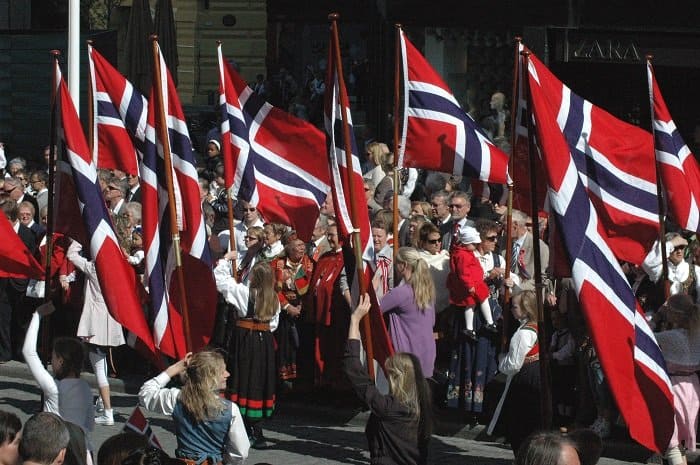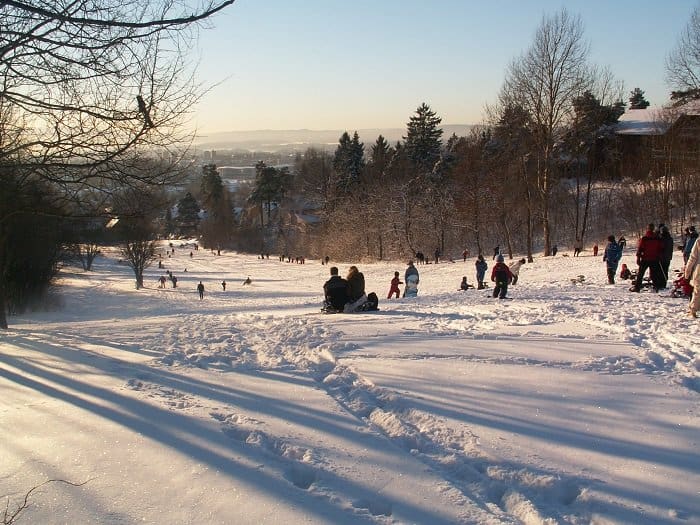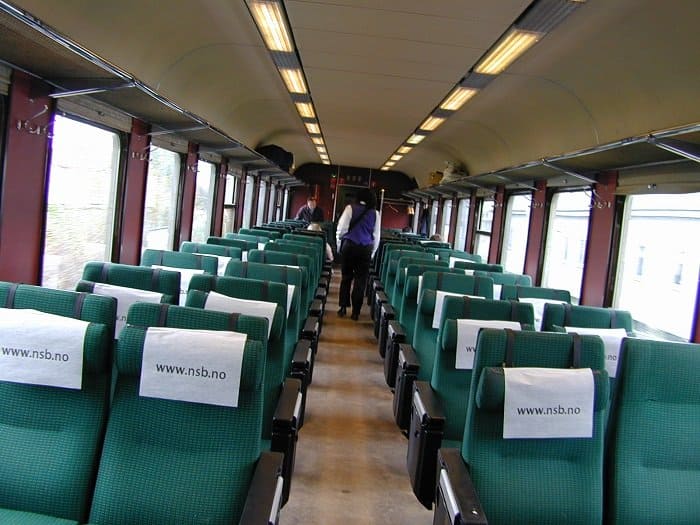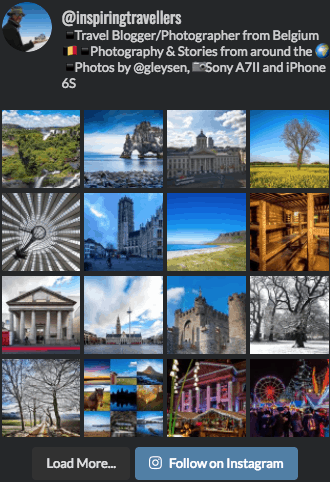Planning a move or visit to Norway? We lived there. Check out our Norway stories and resources.
From time to time we get emails from readers asking us questions ahead of their own moves to Norway or because they are in the process of applying for a visa. Some are still making the decision on whether to move here at all. The other day I was chatting with fellow expat, Megan Starr, of A Suitcase and Stilettos, and we decided to put together a list of things that we wish we’d have known before settling in Norway.
After being here a year I feel like I’ve gotten to know the place very well. That said, I also feel like I don’t understand it at all. While on the surface Norway can seem somewhat similar to Australia or the United States, I assure you that the culture is quite different. I am constantly getting used to things here, which is, of course, the nature of the life of any expat. I have been working hard at seeing some of the items below as being neither good nor bad, just simply the way they are. Though some have definitely been more challenging than others.
1. The honesty policy is alive and well in Norway.
This is definitely one of the nicest things about living here for me. People seem to genuinely trust each other and sometimes I feel like I am living in a village instead of a city. Nowhere else in the world would I not hesitate to leave my purse at the table it a cafe while I go up to order a coffee. The other day we accidentally left an entire bag of groceries at the supermarket and went back two hours later to find it still sitting there. I paid cash at the dentist one time and they didn’t have any change. Instead of giving me a hard time about it, they took the largest bill I had and let me pay the rest on the next visit; I even offered to go and get some smaller bills from a shop nearby and that offer was dismissed with a smile and a wave of the hand.
2. Things can be very efficient here.
While some processes will seem slow or clunky, especially when dealing with government, many are fast, efficient and electronic. For example, Norway is quickly becoming a cashless society, where electronic banking and debit cards are fully integrated for easy bill payments. Many procedures are automated (imagine paying for your doctor’s appointment via a machine at the office) and you can easily book services like hairdresser’s appointments online. Because of the high cost to businesses when hiring employees, you’ll find that many interactions are streamlined. Many practices won’t have receptionists, for example – you simply seat yourself if you have an appointment and wait to be called. A place where this efficiency won’t be found is at the supermarket, where you’ll often line up for awhile because there are so few people working the checkout counters. I wonder when self-service checkout kiosks will find their way here – seems an anomaly that they haven’t already been implemented.
3. You may not be able to get a loan right away.
Norway has its own system of rating the credit-worthiness of individuals. If you are planning to buy a home here or need a car loan, you may find that you have to wait months or even years before you have established good credit. Check around with different banks because, depending on your situation, some may make exceptions or be able to accommodate you. In the meantime, be sure you have enough money to get your life in Norway started before arriving.
4. Taxes, taxes everywhere
In Norway you will constantly be paying taxes whether you are aware of them or not. This starts with the 25 per cent value-added tax (VAT or moms; 14 per cent for food and drink). Then there are property taxes, death (inheritance) taxes, fuel taxes, TV taxes, new car taxes, income taxes (at least 28 per cent) and the wealth tax (1.1 per cent on worldwide assets).
5. It can be difficult to be economical.
Forget about buying staple goods in bulk. Price competition is rare and importing things is not always a solution because of the VAT. Some things I really struggle with, such as the fact that many houses have electric heating instead of gas, which is more expensive.
6. Everything associated with cars and driving is expensive.
From exchanging your licence to the price of a car, to the taxes and fuel costs, driving is expensive in Norway. You have the annual motor vehicle tax, periodic road-worthiness tests, different tyres for different seasons and large fines for speeding. Despite having a good income, we have decided that it’s too cost prohibitive to purchase a car given the relatively short amount of time we will spend in Norway. When you really need a car, there is always the option of renting one from Europe Car for example.
7. Trade unions and collective agreements make a difference.
Norway does not have a minimum wage. Instead, numerous trade unions exist across many professions and enterprises. They look after their members’ interests and fight for improvements in pay and working conditions by creating collective agreements. If your workplace is bound by such an agreement, you will generally get paid more and have a better work environment. If the agreement has been given general application, its provisions will also apply to foreign workers and non-members.
8. You have to stay with a company for more than 12 months to keep the pension money you earned.
Should you change jobs before a year passes, the company has the option to have the private pension money returned to them.
9. You will want to learn Norwegian.
Many Norwegians speak English, but that doesn’t mean they all want to. You won’t have much trouble at the shops or when obtaining basic services if you speak English, but you won’t get much further than that. Much will depend on where you work and the culture there. For example, if you work for an English or American company, you will probably be fine with English. In a Norwegian company, however, most of the employees will expect to speak Norwegian in social situations, even perhaps in meetings. This is true even when the work is done in English.
Your mail from companies in Norway will be in Norwegian. You will also encounter other non-English speaking foreigners to whom you may only be able to communicate in Norwegian. If you attend parties and social events, many people will be speaking Norwegian even if there are large numbers of English speakers present. So be sure you are happy to learn.
10. Sunday truly is a day of rest.
Most Norwegians do not work on Sundays. Trading hours are generally Monday through Saturday, with only the odd supermarket open on Sunday. Most offices are closed on Saturdays as well.
11. You will pay more for vitamins. A lot more.
Norway has extremely restrictive supplement regulations. High-dose vitamins require a prescription and the prices for the ones that are sold over the counter are exorbitant. If you’re like me and take a lot of different vitamins, it’s going to hit your pocketbook. A normal sized pack of 200 mg Vitamin C tablets, for example, will cost around US$25. On a positive note, the quality of the supplements sold in Norway is tightly regulated and supposedly high.
12. Norway is a great place to be a parent.
If you are paying taxes in Norway, the government will look after your children from the moment of conception. All your doctor’s appointments for pregnancy will be free if you see professionals in the public system. A variety of benefits are available, including the pregnancy benefit and the parental benefit that provides you with income during maternity and paternity leave. These are generous – 100 per cent for 47 weeks or 80 per cent for 57 weeks, and they can be shared between the parents. If you don’t qualify for that, there are lump sum benefits for maternity and adoption. Family allowances help to pay for the costs of raising a child until he or she turns 18. If you look after your young child at home, you may receive a ‘cash-for-care’ benefit. If you’re happy with public schools, elementary education is free from birth to age 16. University fees seldom exceed 500 kr per semester (that’s less than US$100). Additionally, a variety of free counselling, welfare, mediation and women’s services are available. Of course, if you don’t have children, you’ll be paying for these services anyway through your taxes.
13. Getting correct answers to your questions can be difficult.
I have endless frustration when trying to find information, especially from government offices. This doesn’t always happen, but often when I call to enquire, I get one answer from one person and, if this doesn’t sound right or gel with other information I’ve heard, I might call back for a second opinion. This second opinion can often vary from the first; and sometimes it’s a completely different answer. I’ve also found that you have to ask a lot of questions because people won’t automatically tell you things. You may have a question about one part of something, but there will be additional information that could be helpful. Unless you ask about that information, however, it may not be given to you. This is not an intentional slight or anything like that, I’ve just noticed that it seems to be a cultural difference. I’m used to working with checklists when providing information and being very thorough. That isn’t always thought of here in Norway so just be sure to be thorough yourself in your enquiries.
14. It’s expensive to travel within the country.
Hotels and flights in Norway aren’t cheap, unless you are just flying back and forth to Oslo. We’ve found our desire to explore the rest of the country hampered by both these costs and those of restaurants and cultural activities. It just seems cheaper to head to the rest of Europe.
15. Holidays are taken very seriously here.
Employees get five weeks of holidays per year, three of which can be taken consecutively over the summer period (forget about getting anything done in the summer). There are a few school holiday periods throughout the year and sometimes it can feel like there is a lot more play than work going on in Norway. They even stagger the school holiday periods from region to region so that the ski resorts don’t get overrun all at once. If anything else frustrates you about Norwegian systems, you’ll smile at how organized vacation is.
For 15 more things to know about Norway, head over to Megan’s blog…
What could you add to this list?
Planning a move or visit to Norway? We lived there. Check out our Norway stories and resources.
You may also enjoy these similar posts:
- 602shares
- Share on Facebook123
- Pinterest103
- Twitter5
- 73
- 45
- Tumblr
- Email8
- Print6
- Evernote




